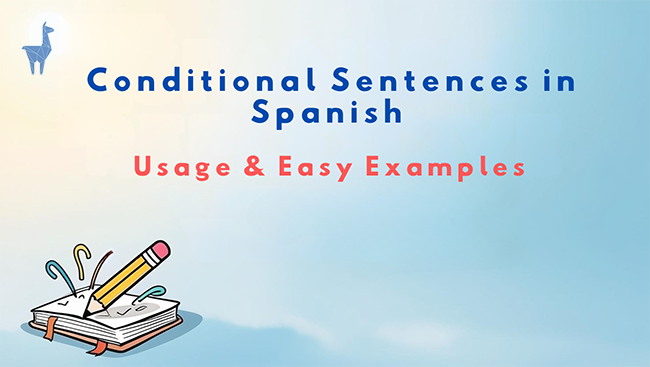Master Conditional Sentences in Spanish: A Simple Guide (With Examples!)

Want to say “I would travel if I had money” or “If you study, you’ll pass” in Spanish? Conditional sentences let you talk about possibilities, hypothetical situations, and polite requests.
This guide breaks it down from basic to advanced, with clear examples + English translations. Let’s dive in!
🔗 For all the grammar rules and charts about the Conditional Tense in Spanish, see our guide: The Conditional Tense in Spanish
📌 Quick Summary: Spanish Conditional Sentences
| Type | When to Use | Example | Translation |
|---|---|---|---|
| Real Conditional | Possible situations (if X happens, Y will happen) | Si estudias, aprobarás. | If you study, you’ll pass. |
| Hypothetical Conditional | Unlikely/imaginary situations | Si tuviera dinero, viajaría. | If I had money, I’d travel. |
| Past Unreal Conditional | Impossible past situations | Si hubiera sabido, habría venido. | If I had known, I would have come. |
🔗 Need verb conjugations? Try our Spanish Verb Conjugator Tool.
1️⃣ Real Conditional (Possible Situations)
Use: When something is likely to happen.
Structure:
Si + [Present Tense] + [Future/Conditional]
Examples:
✅ “If you study, you will pass.”
→ Si estudias, aprobarás.
✅ “If it rains, we’ll stay home.”
→ Si llueve, nos quedaremos en casa.
✅ “If you want, I can help you.”
→ Si quieres, puedo ayudarte.
(Notice: The condition is real and possible!)
2️⃣ Hypothetical Conditional (Unreal Situations)
Use: For dreams, unlikely scenarios, or polite requests.
Structure:
Si + [Imperfect Subjunctive] + [Conditional]
Examples:
✅ “If I won the lottery, I’d buy a house.”
→ Si ganara la lotería, compraría una casa.
✅ “If I were you, I’d learn more verbs.”
→ Si fuera tú, aprendería más verbos.
✅ “Could you help me?” (Polite request)
→ ¿Podrías ayudarme?
🔗 For a full breakdown, see our guide: The Conditional Tense in Spanish: Rules, Usage & Easy Examples.
3️⃣ Past Unreal Conditional (Missed Opportunities)
Use: For regrets or impossible past situations.
Structure:
Si + [Past Perfect Subjunctive] + [Conditional Perfect]
Examples:
✅ “If I had known, I would have come.”
→ Si hubiera sabido, habría venido.
✅ “If you had called me, I would have answered.”
→ Si me hubieras llamado, habría contestado.
✅ “She would have been happy if she had won.”
→ Ella habría estado feliz si hubiera ganado.
(This one is for advanced learners—don’t worry if it’s tricky at first!)
💡 When Else Do We Use the Conditional?
Besides “if” sentences, the conditional tense is great for:
✔ Polite requests – “Could you…?” → ¿Podrías…?
✔ Giving advice – “You should…” → Deberías…
✔ Dreaming/wishing – “I would love to…” → Me encantaría…
Examples in Action:
- “Could you close the door?” → ¿Podrías cerrar la puerta?
- “You should rest.” → Deberías descansar.
- “I would love to visit Spain.” → Me encantaría visitar España.
🚀 Practice Time! (Test Yourself)
A. Fill in the blanks:
- If I have time, I ___ (will go) to the party.
→ Si tengo tiempo, ___ a la fiesta. (Answer: iré) - If I were rich, I ___ (would buy) a yacht.
→ Si fuera rico, ___ un yate. (Answer: compraría)
B. Translate to Spanish:
- “If she had studied, she would have passed.”
→ Si ___, ___ aprobado. (Answer: hubiera estudiado, habría)
🔗 Think you’ve got it? Test your skills with our Conditional Tense Quiz!
🔑 Key Takeaways
✔ Real conditions? → Present + Future
✔ Hypothetical? → Imperfect Subjunctive + Conditional
✔ Past regrets? → Past Perfect Subjunctive + Conditional Perfect
🔗 Master verb forms with our Spanish Verb Conjugator Tool.
🔗 For more examples, visit: The Conditional Tense in Spanish: Rules, Usage & Easy Examples
Ready to Test Your Skills for DELE B1 Exam?
Take our Spanish Conditional Tense Quiz to practice what you’ve learned with instant feedback and helpful explanations!
Key Points to Remember
- All verbs use the same endings (-ía, -ías, -ía, -íamos, -íais, -ían)
- Learn the 12 irregular stems – they’re worth memorizing!
- Use for polite requests instead of commands
- Combine with “si” clauses for hypothetical situations
- Use “deber” + conditional for “should”
Final Tip:
The best way to learn conditionals? Use them in real life! Try making:
- A list of dreams (“If I could…”)
- Polite requests (“Could you…?”)
- Regrets (“If I had…”)
*(Answers: A1-iré, A2-compraría, B1-hubiera estudiado, habría)*
Now go practice—you’ve got this! 💪
📖 Ready for a challenge? Take our Quiz: Conditional Tense Quiz now!



